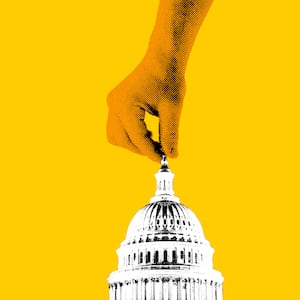As former President Donald J. Trump re-enters the political spotlight and begins campaigning in Iowa and the early Republican states, all evidence points to him handily winning the nomination.
National polls have Trump at 61.3 percent nationally and 50 percent in Iowa, ahead of Ron DeSantis, Nikki Haley, and Vivek Ramaswamy.
With that in mind, it’s crucial to consider the potential repercussions of a Trump presidency. Project 2025, a nearly 900-page document)" href="https://urldefense.com/v3/__https:/thf_media.s3.amazonaws.com/project2025/2025_MandateForLeadership_FULL.pdf__;!!LsXw!X5jNbeJFReI-z4Le_vTXs2iAzFjSrK3OQ1vBgX6bL6EDzSCiOliCBBLp112nz9WoRVnfJhjnwKqeNkpCgm3Kk_UtS__3$">nearly 900-page document led by the conservative advocacy group The Heritage Foundation and 80 other right-wing organizations, outlines what they’d like President Trump, or a Republican president, to accomplish in his first 180 days.
While Trump’s campaign rhetoric predominantly revolves around settling scores with political adversaries, grappling with legal challenges, and harboring hopes for economic downturns that could favor his return, Project 2025 is a portal into the potential policy landscape under his leadership.

Republican presidential candidate Nikki Haley puts her hand up to Vivek Ramaswamy as Florida Gov. Ron DeSantis (C) listens during the NBC News Republican Presidential Primary Debate on Nov. 8, 2023 in Miami, Florida.
Joe Raedle/GettyProject 2025’s goal is to recruit thousands of conservatives to Washington, D.C., to replace the existing government workers they believe are part of the “deep state” to enact their radical Republican agenda. Their strategy is straight from a Fox News chyron; the first few pages of the document stress the vast reaches of “cultural Marxism” and the importance of deleting terms like diversity, equity, and inclusion (DEI) and gender equity from any piece of federal legislation that exists.
Their proposed agenda is comprehensive, advocating for the privatization of the Transportation Security Administration (TSA), the weakening of protections against foreign election interference, a reduction in visas for international students, and, notably, the dismantling of federal abortion protections. This encompasses aggressive measures such as restricting access to contraception, leveraging the Center for Disease Control (CDC) for heightened “abortion surveillance” and data collection, and revoking a Department of Defense policy prohibiting abortion travel funding.
Concerning the call to weaken protections against foreign election interference, Project 2025 suggests ending the involvement of the United States Cyber Command (USCYBERCOM) to strengthen U.S. election protection against foreign interference. USCYBERCOM is one of the branches of the United States Department of Defense (DOD), it’s our nation’s first line of defense in cyberspace. Project 2025 believes that the Department of Defense is being used as a tool for political purposes. One of the many flaws in Project 2025’s strategy lies in its disregard for the genuine threat of foreign interference in American elections.

Republican presidential candidate and former U.S. President Donald Trump wraps up a campaign event on Dec. 19, 2023, in Waterloo, Iowa.
Scott Olson/GettyIn 2020, Iranian hackers breached a municipal government reporting system that publishes election results. Thankfully, they were thwarted by the USCYBERCOM team. The Iranian hackers were still able to obtain confidential voter data, deploying misleading emails to spread misinformation and manipulate election results. By dismissing the threats from the 2020 election, Project 2025’s election plan jeopardizes our democracy and undermines the legitimacy of election results.
The project’s ideology on elections aligns with the typical conservative approach, advocating that deregulation is a universal solution and that restraining the federal government will naturally resolve various issues. However, it is crucial to recognize that such an approach may inadvertently expose vulnerabilities, enabling adversaries to exploit our democracy and elections. Ignoring this potential risk could leave our democratic processes susceptible to external threats.
One of the most contentious aspects of Project 2025 lies in its ambitious approach toward abortion. The document argues that eliminating abortion is a vital step in “Restoring the Family as the Centerpiece of American Life.” While this proclamation aligns with conservative values, the proposed measures are drastic and do not align with where most of the American public stands on this issue. According to a Associated Press-NORC Center for Public Affairs Research poll released in July 2023, a majority of U.S. adults—including those living in states with strict limits on abortions—want, at a minimum, abortion to be legal at the beginning of pregnancy.
Additionally, Project 2025 contradicts the views held by a majority of the American public by proposing restrictive measures on access to contraception. By limiting access to contraception, the document aims to curtail family planning options, potentially impacting the lives and choices of millions of people. While framed under the banner of family values, such policies risk infringing upon personal autonomy and reproductive freedom.
Further, the document recommends leveraging the CDC for intensified “abortion surveillance” and data collection. This proposition would weaken privacy rights and is ripe for government overreach into Americans’ sensitive medical information.
The notion of heightened surveillance on abortion procedures could have a chilling effect on individuals seeking reproductive healthcare, creating an atmosphere of fear and mistrust between citizens and the health-care system. National advocacy groups, such as the American Civil Liberties Union (ACLU), have consistently warned about safeguarding digital privacy in a post-Dobbs era. Project 2025 seems to embody and underscore these concerns.
Project 2025 also suggests blocking a DOD policy restricting abortion travel funding. This policy change would have far-reaching consequences, particularly for military personnel and their families stationed overseas. Revoking funding for abortion travel could place an undue burden on members of our armed forces, limiting their access to safe and legal reproductive health-care options.
If Trump performs as well as predicted in Iowa and successfully navigates the Republican primary to defeat incumbent President Biden in the general election ultimately, there’s a plausible scenario where Project 2025 becomes a pivotal aspect of his administration’s agenda.
Given the historical pattern of a lack of emphasis on concrete policy details and Trump’s expressed preference for focusing on pursuing his political adversaries by leveraging the FBI and DOJ, it appears likely that he would delegate the intricacies of legislating to right-wing power brokers eager to champion their radical Republican ideals.
The moment Trump takes the oath of office and utters, “So help me, God,” the gears of the right-wing conservative movement could be set in motion, translating the ambitious Project 2025 document into action. The potential implications of a Trump administration could be detrimental to Americans. We must prevent this from happening.









